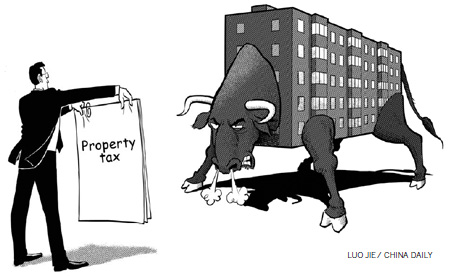View
Debate: Property tax
Updated: 2011-03-07 08:06
(China Daily)

One month after Shanghai and Chongqing launched a pilot property tax project, a heated public debate is raging on whether such a tax should be introduced throughout the country. Two scholars differ in views.
Liu Guiwen
A measure in the right direction
The imposition of a property tax is cooling housing prices in Shanghai and Chongqing municipalities, especially in Chongqing which now taxes all villas and new apartments sold above the average price.
Chongqing imposed its property tax on Jan 28, charging 0.5 percent of the transaction price a year for villas and apartments that cost less than three times the average price. The property tax rate for villas and apartments sold between three and four times the average price is 1 percent and for those that cost more than four times the average, 1.2 percent.
Some people still say a property tax is "illegal". But that is not true because way back in 1986 the State Council issued the Temporary Regulations on Real Estate Tax which said local governments could levy property taxes. Since a property tax is the domain of local governments, they can decide its rate according to local conditions. Local governments can modify property tax rules, too, because they are based on the State Council's regulation instead of law.
This should make debating the legality of a property tax a waste of time. The focus, instead, should be on whether a property tax can turn the property market growth in a healthy direction. My answer to that is "yes".
By March 1, Chongqing had collected about 150,000 yuan ($22,838) in property tax from 17 homeowners - mostly high-end apartment owners and real estate speculators. Though the amount is rather small, the Chongqing government expects to collect 150 million yuan in property tax by the end of this year and use most of the tax revenue to build public rental houses. In three years, it will spend about 100 billion yuan to build such houses which will have a combined area of 40 million square meters.
Many will argue that despite imposing the property tax housing prices in Chongqing increased 0.49 percent month-on-month in February and the average housing price was still 6,661 yuan per square meter. They, however, should know that the business volume of Chongqing's real estate market has already shrunk, indicating that developers, speculators and intermediates are on the back foot.
The property tax is the strongest measure yet taken to deflate the property market bubble and should be welcomed for three reasons. First, it will help narrow the gap between the rich and the poor in Chongqing, because the local government will use the tax revenue to build public rental houses.
Second, a property tax will gradually reduce local government's dependence on transfer of land-use rights for revenue. The dependence can be gauged from the fact that in 2010 alone, Chongqing reportedly made 32.6 billion yuan from land revenue, about 16 percent of its total of 199.1 billion yuan. The amount Chongqing expects to collect in property tax this year may be too small to offset its earning from land revenue, but Chongqing Mayor Huang Qifan has said the tax will be extended to personal high-end and many privately owned houses at an appropriate time.
Third, a property tax will curb speculative investment in the real estate market because of the rising cost of owing a house, especially a bigger or highly expensive one.
According to a recent nationwide online survey by China Youth Daily, 92.9 percent of the respondents said the imposition of a property tax would influence their plan to buy a house. More than 45 percent said they would postpone buying and 24.9 percent said they had given up the idea altogether.
Property tax is expected to especially curb the demand for high-end apartments, which more often than not are bought by investors and speculators. Once this happens the prices of such houses will start dropping, which in turn will reduce the flow of speculative funds and the home-buying frenzy.
But a property tax alone cannot fix the real estate market. Though the tax will increase the cost of owning more houses, its rate is limited and can hardly reduce housing prices in the long term. So to deflate the housing market bubble, the government has to take more comprehensive reform measures. It should use property tax revenue to build public rental and affordable houses for low- and middle-income groups, and establish a more diverse system of housing supply that will have far-reaching consequences on the property market.
It is apparent that the property tax now focuses only on high-end houses. But all local governments should use the policy to cover other sectors. The development of the housing market has been problematic across the world, and China is no exception. But policies like public rental housing programs and property tax are moves in the right direction to make buying or renting a house more affordable for people.
The argument that the increased cost of owning more than one house as a result of the property tax will be transferred from investors to common homebuyers and tenants is somewhat distorted. Property tax can affect the real estate market but it is mainly affected by the demand-and-supply relationship. Overall, property tax will have a positive effect on lowering demand and thus housing prices.
Liu Guiwen is a professor in the Faculty of Construction Management and Real Estate of Chongqing University. These are excerpts of his interview with China Daily's He Bolin.
Dong Fan
A move that is faulty, confusing
Property tax, implemented on a trial basis in Chongqing and Shanghai municipalities, is far from being the right measure to cool the real estate market. Nor is the policy to impose such a tax scientific.
For example, the standards set by the Chongqing government are confusing and unfair. The local government is imposing the property tax on all villas, irrespective of whether they are up for sale or were sold in the past. But when it comes to high-end apartments, it is imposing property tax only on the new ones, which means people who bought such apartments in the past won't be subjected to taxation. Is there any justification in not imposing the tax on those who bought high-end apartments earlier?
Some people have swept the question of legality under the carpet and claim that the property tax will help deflate the property market bubble. But can the tax really bring down housing prices? The average housing price in Chongqing was 6,661 yuan ($1,014.5) in February, a month-on-month increase of 0.49 percent, even though the property tax was imposed on Jan 28. Speculators cannot be driven away from the real estate market because the profit they can make - with or without the property tax - is still much more than the cost of owning several houses.
The Chongqing government describes a high-end apartment as one whose floor space and transaction value are both more than two times the average in the city. This is a flawed logic, because few houses will meet the criterion.
Even Chongqing Mayor Huang Qifan has confessed that the total property tax revenue will be only 150 million yuan this year. The tiny amount will be just a token for a city like Chongqing, which collected 199.1 billion yuan in total revenue last year.
Property tax earnings cannot lessen the local government's dependence on land-based revenue, either. It is estimated that even if a property tax of 1 percent was imposed throughout the country, the total revenue would be about 500 billion yuan, less than even one-fifth of the 2.9 trillion yuan that transfer of land-use rights generated last year.
Moreover, in cities where most of land has already been transferred, the local governments would be forced to extend the tax to ordinary homeowners to earn maximum revenue, which will increase the recurring cost of owning a house.
The Chongqing authorities have said that people without local house registration (hukou), too, will have to pay property tax when and if they buy a house. This is further discrimination against middle-income migrant workers who are already in a disadvantageous position.
The government seems to be in hurry to impose new taxes. It has been increasing the number of taxes without making any effort to revise or eliminate charges that are outdated and unreasonable. As a result, the government's tax revenue and total income both have been growing at the astonishing rate of nearly 30 percent a year. Last year, the central government's tax revenue increased to 7.739 trillion yuan.
The burden being imposed on people and businesses will create long-term barriers for the next round of socio-economic development and thus increase commodity prices.
Some countries are taking or have already taken measures to ease the burden of homebuyers.
In Australia, for example, the total charges a homeowner will pay for water, electricity and maintenance, and the total depreciation are deducted from the price of the house that is taxed.
Instead of implementing such measures, our government is burdening people with more taxes in times of serious inflation.
Besides, there is incongruity between property tax as a short-term measure and the government's long-term goal of stabilizing the real estate market.
What the Chongqing government has imposed can hardly be called a property tax. It is charging property tax on the selling price of a house when a real property tax should be charged on a property's assessed value.
Since there is no independent institution to assess property value such a move will cause more confusion as property tax is extended to other cities. Hence, such a tax cannot be fair.
Dong Fan is director of the Real Estate Research Center at Beijing Normal University. These are excerpts of his interview with China Daily's He Bolin.
Specials

NPC & CPPCC sessions
Lawmakers and political advisers gather in Beijing to discuss major issues.

Self-made aircraft
An automobile mechanic in Northeast China made a test flight of his self-made aircraft which cost about US$395.

Venetian Carnival
Masked revellers celebrate in Saint Mark's Square in Venice.